What is acupuncture?
Acupuncture is a method of encouraging the body to promote natural healing and to improve functioning. This is done by inserting needles and applying heat or electrical stimulation at very precise acupuncture points.
A Sound Investment In Your Health
Whether the source of illness is physical, emotional, or spiritual, Chinese medical treatments can bring about the healing of not only your primary complaint but the many minor discomforts that may have accompanied it.
Chinese medicine can accelerate recovery from surgery, strengthen the immune system, and alleviate many of the unwanted side-effects of conventional treatment of major illnesses such as Hepatitis C and cancer.
Acupuncture treatments are cumulative – each treatment builds on the previous one to restore you to health.
Will it hurt?
Acupuncture needles are very thin and flexible, not at all like the stiff, hollow hypodermic needles used to inject liquid. You may feel a spreading sensation, heaviness at the needle site, warmth, tingling, a sense of movement within the body, or an electric feeling. Most people find the experience to be quite relaxing and some even fall asleep!
About Acupuncture
Acupuncture is a time-tested means of health care, which makes use of the body's innate ability to heal. The Chinese discovered many centuries ago that stimulating certain areas of the body could alleviate pain, increase vitality and improve a person’s overall ability to function.
Very fine needles, a few hairs width in diameter, are inserted into specific locations on the surface of the body to rectify imbalances in the movement of a person's vital energy or qi (chi), which flows throughout an animating web or network within us.
Acupuncture needles are often used in conjunction with a warming herb, referred to as moxa (artemisia vulgaris). The process of burning small amounts of the herb on or near the skin is called moxabustion and it has been used along with acupuncture since ancient times.
How Can Acupuncture Help You?
Widely received in the West over the past few decades, acupuncture has been scientifically proven to be helpful in alleviating pain. What may be less well understood is that acupuncture is part of a holistic system of medicine that is effective in treating many other conditions and is also effective for preventing illness. This is because disturbances in our energetic system that may lead to illness can be rectified prior to manifesting in the body as physical, mental or spirit level symptoms.
Pulse diagnosis is an important tool in this regard and is used by your practitioner to detect these energetic imbalances. Your pulses may be taken several times during a treatment session. By thorough evaluation, treatments are tailored to the individual and the level of the imbalance.
View the World Health Organization (WHO) list of conditions that may be helped by acupuncture.
Can Acupuncture Improve My Health Overall?
Acupuncture is not only used to treat illness, it can enhance our vitality, our sense of aliveness and our connection to that which is beyond us personally. The more sensitive we become to early disturbances in our wellbeing, the better our chances of avoiding illness. This is one of the great benefits of oriental medicine and practices such as tai ji, qigong and meditation, they place us more in touch with life as a living awareness of ourselves and our connection with nature.
How Often Do You Need To Come for Treatment?
As a form of natural medicine, a number of treatments are often necessary before desired changes occur. Acupuncture is not a "magic bullet" approach, like taking an antibiotic. Rather, it works by enlivening and enhancing our own healing energy and potential. Because imbalances generally develop over time, whether we are aware of subtle changes along the way or not, it may also take some time for balance to be restored.
Usually, one visit per week is sufficient until improvement has been maintained, but in more acute cases, two treatments per week may initially be required. Treatments are then gradually spaced further apart, until there is need for only occasional treatment. Some people choose to come for "tune-ups" at the change of seasons or other particular times of the year.
The nature and severity of a person's imbalance, how long they have had it, as well as lifestyle factors that may be impeding treatment, are all issues that affect the number and frequency of treatments.
To support the healing process, a person may be advised to modify his or her lifestyle by making changes in diet or daily routine, getting more rest, exercising less or more, and so on, depending on the person's constitution and the imbalances that need to be treated.



